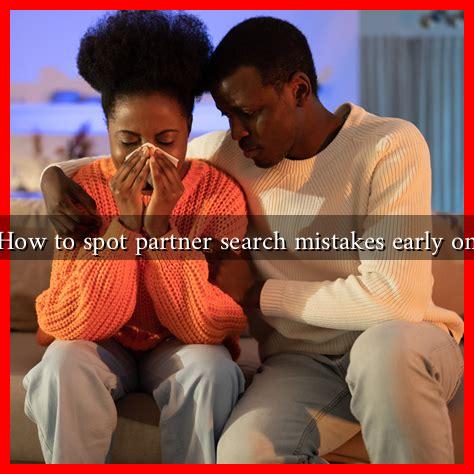-
Table of Contents
- How to Spot Partner Search Mistakes Early On
- Understanding Common Partner Search Mistakes
- How to Spot These Mistakes Early On
- 1. Reflect on Your Intentions
- 2. Pay Attention to Communication Styles
- 3. Trust Your Instincts
- Case Studies: Learning from Others’ Experiences
- Statistics on Relationship Success
- Conclusion: Key Takeaways
How to Spot Partner Search Mistakes Early On
Finding the right partner can be a daunting task, often filled with excitement and anxiety. However, many individuals make common mistakes during their partner search that can lead to disappointment and heartache. Recognizing these mistakes early on can save time, emotional energy, and ultimately lead to healthier relationships. In this article, we will explore how to spot partner search mistakes early on and provide valuable insights to help you navigate the dating landscape more effectively.
Understanding Common Partner Search Mistakes
Before diving into how to spot these mistakes, it’s essential to understand what they are. Here are some common pitfalls that many people encounter:
- Rushing the Process: Many individuals feel pressured to find a partner quickly, leading to hasty decisions.
- Ignoring Red Flags: Some people overlook warning signs in potential partners, hoping that things will improve over time.
- Settling for Less: Fear of being alone can lead individuals to settle for partners who do not meet their standards.
- Overlooking Compatibility: Focusing solely on physical attraction can overshadow the importance of shared values and interests.
How to Spot These Mistakes Early On
Identifying these mistakes early can help you make more informed decisions. Here are some strategies to help you spot potential issues:
1. Reflect on Your Intentions
Before entering the dating scene, take time to reflect on what you truly want in a partner. Ask yourself:
- What are my core values?
- What qualities do I seek in a partner?
- Am I looking for a serious relationship or something more casual?
Having clarity on your intentions can help you avoid rushing into relationships that do not align with your goals.
2. Pay Attention to Communication Styles
Effective communication is crucial in any relationship. Early on, observe how your potential partner communicates:
- Do they listen actively?
- Are they open and honest about their feelings?
- Do they respect your boundaries?
Miscommunication or lack of transparency can be significant red flags that should not be ignored.
3. Trust Your Instincts
Your gut feelings can often provide valuable insights. If something feels off, take a step back and evaluate the situation. For instance, if you notice:
- A partner is overly critical or dismissive of your opinions.
- They exhibit controlling behavior.
- They avoid discussing their past relationships.
These could be signs of deeper issues that may affect the relationship in the long run.
Case Studies: Learning from Others’ Experiences
Real-life examples can provide valuable lessons. Consider the case of Sarah, who rushed into a relationship after a breakup. She ignored her friends’ concerns about her new partner’s behavior, which ultimately led to a toxic relationship. By the time she recognized the red flags, she had invested significant emotional energy. This experience taught her the importance of taking her time and listening to her instincts.
Another example is Mark, who settled for a partner who did not share his values. Initially, he was attracted to her charisma, but as time went on, he realized their fundamental differences led to constant conflicts. Mark learned that compatibility is crucial for long-term happiness.
Statistics on Relationship Success
According to a study by the American Psychological Association, couples who share similar values and communication styles are 50% more likely to have a successful relationship. This statistic underscores the importance of recognizing compatibility early in the partner search process.
Conclusion: Key Takeaways
Spotting partner search mistakes early on can significantly impact your dating experience and relationship success. By reflecting on your intentions, paying attention to communication styles, and trusting your instincts, you can avoid common pitfalls. Remember the lessons learned from others’ experiences and the importance of compatibility. Taking the time to understand yourself and your partner can lead to healthier, more fulfilling relationships.
For more insights on building healthy relationships, consider visiting Psychology Today.


